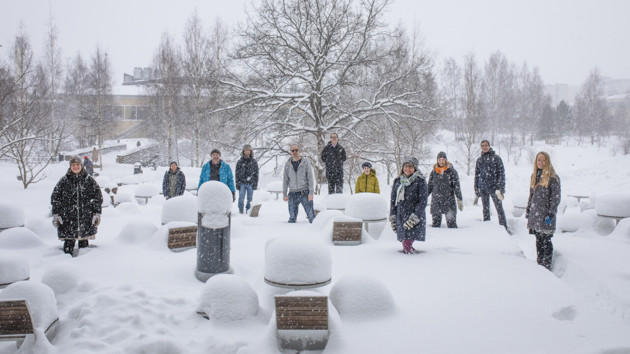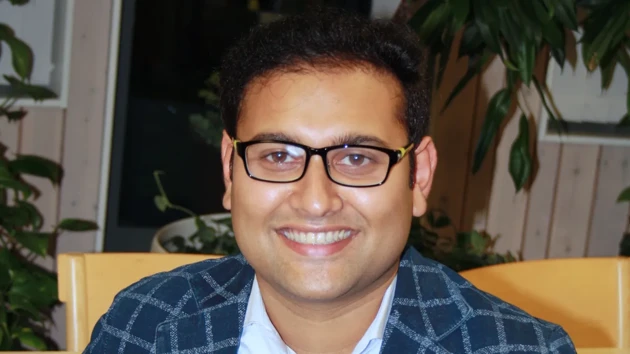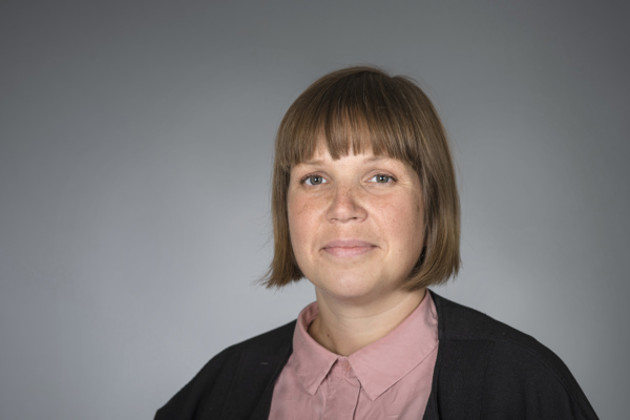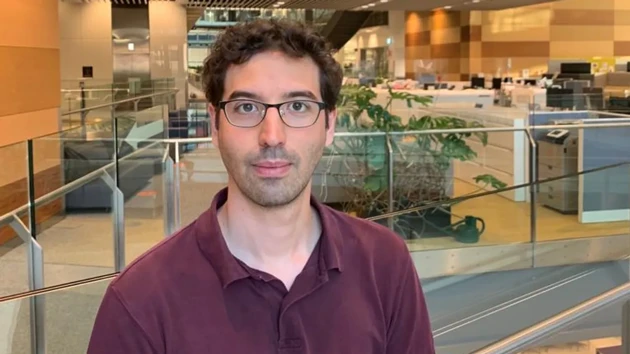MIMS Group Leaders
The independent MIMS Group Leaders are the centre of MIMS. The recruitment of young, talented international scientists is following the non-tenured EMBL Group Leader model. The MIMS Group Leaders and their laboratories are evaluated after five years by external reviewers. After a positive evaluation the funding of the MIMS Group Leaders will be prolonged for additional four years.

MIMS Group Leaders together at Umeå University campus in winter (2021).
MIMS Group Leaders

Barbara Sixt
Cell-autonomous immunity and bacterial evasion strategies in Chlamydia trachomatis.

Björn Schröder
The intestinal mucosal barrier in health and disease.

Chinmay Dwibedi
Employing functional alterations in gut bacteria strains to guide microbiome therapies. DDLS Fellow.

Ellen Bushell
Parasite-host interactions driven by Plasmodium exported proteins.

Iker Valle Aramburu
Illuminating the dark proteome in innate immunity.

Ryo Morimoto
Immune system evolution — cytidine deaminases in adaptive immunity and genome editing.
Research description
Barbara Sixt
Many pathogens colonise their hosts by invading cells and exploiting their interior as a hiding place or growth niche. To survive and thrive within a human cell, microbes need to evade the intrinsic defences of their host cell. My group’s research aims to understand the molecular mechanisms through which pathogens overcome these defences. Currently, we focus on Chlamydia trachomatis, an important bacterial agent of sexually transmitted diseases and blinding ocular infections.
Björn Schröder
Our focus is the intestinal mucosal barrier, which separates us from trillions of gut bacteria. Defects in this barrier are linked to infectious, inflammatory and metabolic disease, and some of those defects are caused by changes in the gut microbial community. As diet is the major factor that influences the composition of the gut bacteria, my group uses different in vivo and in vitro approaches to identify how specific diets affect mucosal barrier function through modulation of the gut bacteria. We focus on intestinal mucus and antimicrobial peptides, which can be considered as the electrical fence of the intestine.
Chinmay Dwibedi
The lab focuses on studying human gut microbes at high resolution, with a particular interest in adaptive evolution and functional variation across different bacterial strains.
DDLS Fellow within the research area of Epidemiology and Biology of Infection.
Ellen Bushell
We are interested in how malaria parasites, Plasmodium berghei, interact with their host and how these interactions shape the course of infection and disease. Malaria parasites invade and replicate within red blood cells, which requires the parasites to completely transform the invaded cell. This is a process associated with extensive export of parasite proteins into the host cell. We systematically map out the genes that encode the exported parasite proteins that directly interact with the host by dissecting their molecular function. We do this by using reverse genetics to disrupt gene function and observe the resulting effect on parasite growth in vivo. The malaria parasite genome encodes 5000 genes, and we employ scalable methods that allow us to target hundreds of genes in parallel and thereby assign gene function across all the genome.
Iker Valle Aramburu
The research in his upcoming lab at MIMS will focus on understanding the role of disordered proteins and microproteins in innate immunity applying a wide range of synthetic and chemical biology approaches.
Ryo Morimoto
Our exploration has centered on the emergence of sophisticated human immune system, orchestrating the interplay between innate and adaptive immunity—an exclusive feature in vertebrates, marked by the generation of diverse antigen receptors through somatic recombination/assembly of the host genome. This intricate process entails the delicate balance of minimizing the risk of genome disruption, potentially leading to cancer or cell death. We focus on understanding host genome editing machinery in invertebrates—a pivotal element in fortifying immune functions against pathogens, demonstrating the fascinating evolutionary landscape of our immune systems.
Latest update: 2024-08-22 Page editor: Nora Lehotai







